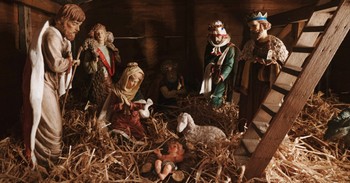Seriously!
Matthew 28:18-20
And Jesus came up and spoke to them, saying, "All authority has been given to Me in heaven and on earth. Go therefore and make disciples of all the nations, baptizing them in the name of the Father and the Son and the Holy Spirit, teaching them to observe all that I commanded you; and lo, I am with you always, even to the end of the age."
Sir Isaac Newton, the English mathematician and physicist, is considered by many to be the greatest scientist who ever lived. He was accorded the honor of being the first scientist to be buried in Westminster Abbey.
The well-known story relates that, on seeing an apple fall in his orchard sometime during 1665 or 1666, Newton conceived that the same force governed the motion of the moon and the apple. He calculated the force needed to hold the moon in its orbit, as compared with the force pulling an object to the ground. And that's how he discovered gravity!
Seriously, what you may not know is that it seems to have been due to the influence and tact of Sir Edmund Halley at his visit in November, 1684, that Newton undertook to attack the whole problem of gravitation, and practically pledged himself to publish his results: these are contained in the Principia. The printing of the work was slow, and it was not published until the summer of 1687. The cost was borne by Halley, who also corrected the proofs, and even put his own research aside to press the printing forward. Historians call it one of the most selfless examples in the annals of science.
Newton began almost immediately to reap the rewards of prominence, while Halley received little credit for his work. But he is known for discovering the comet named after him, which appears briefly every 76 years. However, one profound biographical fact regarding Halley stated that he didn't care who received credit for discoveries—his single mission in life was to advance the cause of science... and he did.
It seems there is an ever-growing problem in the church today, stemming from confusion surrounding our mission in this world. Why exactly are we here? The members of the early church seemed to have had this answer figured out. Gibbon noted in his Decline and Fall of the Roman Empire that the most sacred duty of the new convert was to diffuse among his friends and relatives the blessing which he had received. Harnack, another church historian, wrote that the great mission of Christianity was accomplished by means of casual missionaries.
Why has it become so difficult in our own society to determine why we are here? George Barna, in his book What Americans Believe, revealed the results of a survey of people claiming to be born-again believers. When asked, "Do you have a responsibility to explain your religious beliefs to others who may believe differently?" less than 45% answered affirmatively.
This is a far cry from the passion and fervency displayed by our brothers and sisters who have gone before us, living and dying to advance the gospel. They took the great commission seriously . . . and it didn't matter who got the credit.
Have you committed your life to advancing the cause of Christ? Think about it . . . seriously!
Prayer Point: If you do not come in close contact with unbelievers on a regular basis, then pray that God will bring someone into your life with whom you can share the Gospel. If you already have relationships with those who are unsaved, pray that God will not only open doors of opportunity for you to witness, but that He will give you boldness when that time comes.
Extra Refreshment: Read the book of Jonah 1 and witness God's incredible mercy on display, as well as His heart for the lost.
Many ministries today expound on life and illustrate with Scripture;
we’re committed to expounding on Scripture and illustrating with life!









